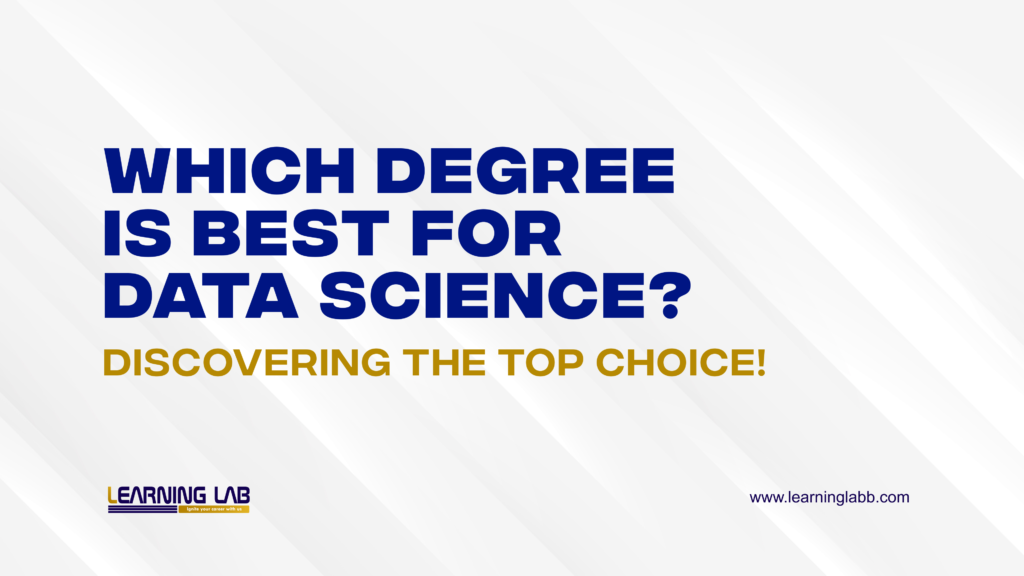As technology continues to advance, the demand for data scientists is on the rise.
Data science and which degree is best for Data Science have become key drivers of innovation, enabling businesses to make data-driven decisions and gain a competitive edge.
If you’re passionate about data analysis, problem-solving, and working with cutting-edge technologies, pursuing any of the industry specific data science degrees could be the right path for you.
In this article, we’ll explore various which degree is best for data science that can lead to a rewarding career in data science and help you make an informed choice based on your interests and career goals.
Which Degree is Best for Data Science?
Well, if we talk about Indsutry specific data science degrees then you are fortunate enough to find multiple data science degree like:
- Certification in Data science tools and technologies,
- industry specific Data science degrees
- Online Data science degrees
And all the Bachelors and master’s data science degree teach you essential skills for a data scientist.
Let’s have a look at Which degree us best for data science for you?
- Bachelor of Science in Computer Science (BSCS)
A BSCS degree equips students with a strong foundation in computer science principles, programming languages, algorithms, and data structures.
This degree provides a comprehensive understanding of data analysis and the technical skills required to work with vast datasets.
Graduates can pursue roles like data analyst, data engineer, or machine learning engineer.
- Bachelor of Science in Statistics
A Bachelor’s degree in statistics offers a solid grounding in statistical methods, data interpretation, and probability.
This degree provides the expertise to analyze and draw insights from complex datasets considering it among the most useful industry specific data science degree.
Statisticians are highly sought after in various industries for their ability to work with data and make data-driven decisions.
- Bachelor of Science in Mathematics
A Bachelor’s degree in mathematics equips students with strong analytical and problem-solving skills.
Mathematics graduates can specialize in data science, learning to apply mathematical models and algorithms to analyze and interpret data effectively.
But being a math graduate if you still think that you need certifications in data science tools and technologies then you can opt for online data science degrees like a data science degree from Learning Lab. (hyperlink)
- Bachelor of Science in Data Science
As the field of data science grows, more universities are offering specialized Bachelor’s degrees in Data Science.
These programs combine computer science, statistics, and domain-specific knowledge to create well-rounded data scientists.
- Bachelor of Science in Business Analytics
This degree focuses on the essential skills for a data scientist like the intersection of business and data science.
Students learn how to analyze data to identify trends, optimize processes, and make strategic business decisions.
- Master of Science in Data Science
A Master’s Data Science degree provides advanced training in data analysis, machine learning, and data management.
It is an excellent option for those looking for essential skills for a data scientist or to deepen their knowledge and expertise in the field.
- Master of Science in Computer Science (MSCS)
MSCS graduates gain specialized skills in data mining, artificial intelligence, and data visualization.
This degree prepares individuals to tackle complex data-related challenges.
But if you still do not find this enough then you can always do some small certifications in data science tools and technologies to begin with.
- Master of Science in Statistics
A Master’s degree in statistics offers in-depth knowledge of statistical theories and methodologies.
Graduates can work as statisticians or data analysts in various industries.
- Master of Business Administration (MBA) with a Pinch in Business Analytics
An MBA with a focus on business analytics equips graduates with the skills to leverage data to drive business growth and make informed strategic decisions.
- Master of Science in Machine Learning
This degree focuses on the development and application of machine learning algorithms.
Graduates are well-prepared for roles in artificial intelligence, robotics, and data-driven industries.
- Ph.D. in Data Science
For those seeking a research-oriented career in data science, a Ph.D. offers an opportunity to contribute to the field’s advancements through cutting-edge research.
- Ph.D. in Statistics or Applied Mathematics
A Ph.D. in statistics or applied mathematics enables individuals to delve deeper into data analysis and statistical modeling, leading to roles in academia, research, or high-level data science positions.
- Dual Degrees (e.g., MBA + MSCS)
Some universities offer dual degree programs that combine business and technical expertise.
These programs are ideal for professionals seeking to bridge the gap between data science and business strategy.
- Online Data Science Degrees
With the rise of online education, many reputable institutions offer accredited data science degree through virtual learning platforms.
Online Data Science degrees provide flexibility for working professionals making them enter this industry very smoothly in less time.
- Data Science Bootcamps
Data science bootcamps are short, intensive programs that focus on practical skills and real-world projects. They are a great option for individuals seeking a fast-track route into the data science field and entering the industry with confidence.
- Certifications in Data Science Tools and Technologies
In addition to formal online data science degrees, obtaining certifications in popular data science tools and technologies (e.g., Python, R, SQL, Tableau) can enhance your employability and skillset.
- Industry-Specific Data Science Degrees
Some universities offer offline and online data science degrees with a focus on specific industries like healthcare, finance, or cybersecurity.
These programs cater to the unique data challenges and all the essential skills for a data scientist in each sector.
- International Data Science Degrees
Exploring online data science degrees in other countries can offer a global perspective on data analytics and a chance to experience diverse cultures.
- Consideration of Data Science Degree Rankings
When choosing a data science degree program, consider university rankings and reputations, as they can impact job prospects and networking opportunities.
- Internships and Work Experience
Complementing your data science degree with internships and work experience can provide valuable hands-on skills and industry connections.
There are various online data science degrees that can help you grab this opportunity.
- Networking and Professional Associations
Joining data science communities and professional associations can expand your network and open doors to job opportunities.
- Personal Projects and Portfolios
Building personal data science projects and maintaining a portfolio can showcase your abilities to potential employers.
- Soft Skills Development
In addition to technical expertise, developing soft skills like communication, problem-solving, and teamwork is crucial for success in the data science field.
- Continuous Learning and Upskilling
Data science is a rapidly evolving field. Staying updated with the latest trends and technologies is essential for career growth.
Online data science degrees can be a career booster for you.
- Personal Interests and Passions
Finally, consider your personal interests and passions when choosing a degree. A genuine passion for data science will drive you to excel in your chosen career path.
Conclusion
Selecting the ideal data science degree is a pivotal decision with far-reaching consequences. The diverse range of options, from BSCS to specialized programs, offers unique advantages for aspiring data scientists. By considering personal interests, skills, and industry demands, individuals can embark on a rewarding and fulfilling data science career.
FAQs
Q: What is the minimum educational requirement for a data science career?
A: While some entry-level roles may accept a Bachelor’s degree, a Master’s degree or higher is generally preferred for more advanced positions in data science.
Q: Is a Ph.D. necessary for a successful data science career?
A: A Ph.D. is not always necessary for a successful data science career. However, it can be advantageous for research-oriented roles and higher-level positions.
Q: Can I transition to data science from a non-technical background?
A: Yes, it is possible to transition to data science from a non-technical background. Taking relevant courses, and certifications, and building a strong portfolio can help make the switch.
Q: Are online data science degrees as reputable as traditional ones?
A: Yes, many reputable universities offer accredited online data science degrees that hold the same value as traditional degrees.
Q: What are some essential skills for a data scientist?
A: Data scientists should have proficiency in programming languages (Python, R), statistical analysis, machine learning, data visualization, and problem-solving.





